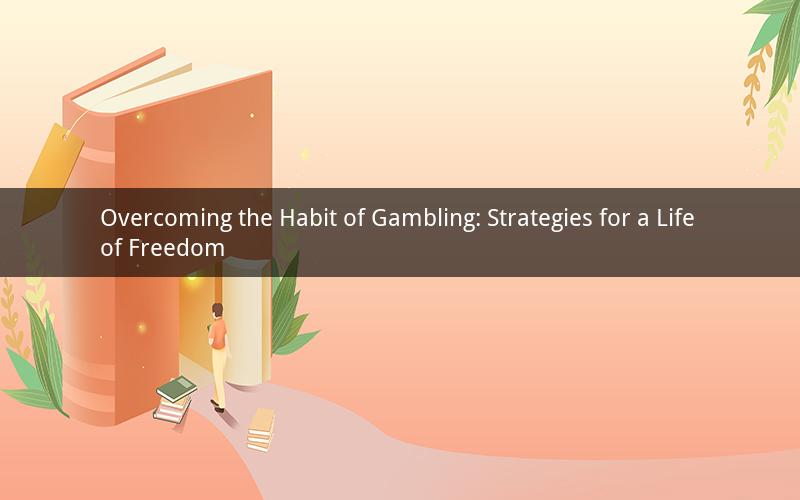
Introduction:
Gaming can be an enjoyable and thrilling pastime, but when it crosses the line into addiction, it can lead to a host of problems. Quitting gambling may seem daunting, but with the right strategies, you can break free from the cycle of compulsive betting. In this article, we will explore various approaches on how to quit gambling and build a life free from the allure of chance.
I. Understanding the Problem
Before delving into the methods to quit gambling, it's essential to recognize the problem at hand. Here are a few key points to help you understand the gravity of your gambling habit:
1. Identify the signs of gambling addiction: Does your gambling interfere with your daily responsibilities? Do you feel a need to gamble more and more to achieve the same thrill? If so, you may be suffering from gambling addiction.
2. Acknowledge the consequences: Are you experiencing financial, emotional, or legal difficulties due to your gambling habit? These are clear indicators that it's time to take action and quit.
II. Setting Goals and Establishing a Support System
To quit gambling, it's crucial to set specific goals and create a support system that will help you stay on track. Here's how you can achieve this:
1. Define your reasons for quitting: Whether it's to protect your loved ones, save money, or regain control of your life, having a clear motivation can make the process more manageable.
2. Establish a quit date: Picking a specific day to stop gambling will give you a target to aim for and a sense of accomplishment when you reach it.
3. Surround yourself with support: Lean on friends, family, or professionals who can offer guidance, encouragement, and accountability during your journey to quit gambling.
III. Strategies for Quitting Gambling
Now that you have a clear understanding of the problem and a support system in place, let's explore some strategies that can help you quit gambling:
1. Avoid trigger situations: Identify situations that make you want to gamble and take steps to avoid them. This could include staying away from casinos, limiting time spent online, or deleting gambling apps from your phone.
2. Develop a budget: Set a strict budget for entertainment expenses and stick to it. This will help you resist the urge to spend money on gambling activities.
3. Replace gambling with healthier habits: Engage in activities that provide fulfillment and enjoyment, such as sports, hobbies, or socializing with friends and family.
4. Use self-help resources: Consider downloading apps or reading books that can help you stay focused on your goal. Additionally, you can join support groups like Gamblers Anonymous or attend therapy sessions to address underlying issues contributing to your gambling addiction.
5. Reward yourself for progress: Set milestones along the way and celebrate your achievements. This will keep you motivated and make the process more enjoyable.
IV. Dealing with Relapse
Relapse is a common challenge when quitting gambling. It's essential to recognize the signs of a relapse and be prepared to address them:
1. Identify potential triggers: Once you've quit gambling, be vigilant about identifying situations that may lead to a relapse. Understanding your triggers will help you take proactive steps to avoid them.
2. Develop a relapse prevention plan: In case of a relapse, have a plan in place to address the situation promptly. This could involve seeking support from your support system, attending therapy sessions, or contacting a professional.
V. Conclusion
Quitting gambling may be a challenging endeavor, but it's certainly achievable with the right strategies and support. By understanding the problem, setting goals, and implementing the aforementioned methods, you can overcome your gambling addiction and build a life free from the allure of chance. Remember, it's never too late to take control of your life and create a future filled with hope and happiness.
Questions and Answers:
1. Q: Can I quit gambling on my own, or do I need professional help?
A: It's possible to quit gambling on your own, but many find it helpful to seek professional support from therapists, counselors, or support groups.
2. Q: How long does it take to quit gambling?
A: The duration of quitting gambling varies from person to person. Some may experience immediate success, while others may require weeks, months, or even years to overcome their addiction.
3. Q: What are the consequences of gambling addiction?
A: The consequences of gambling addiction can be severe, including financial loss, damaged relationships, legal problems, and mental health issues.
4. Q: How can I overcome the urge to gamble when I feel stressed or bored?
A: Instead of turning to gambling, find alternative coping mechanisms, such as exercising, meditating, or engaging in a hobby that brings you joy.
5. Q: Can I ever go back to gambling if I quit?
A: Once you've quit gambling and built a life free from addiction, it's crucial to stay vigilant and avoid the temptation to gamble again. If you feel the urge to return to gambling, seek help and support to stay on the path to recovery.